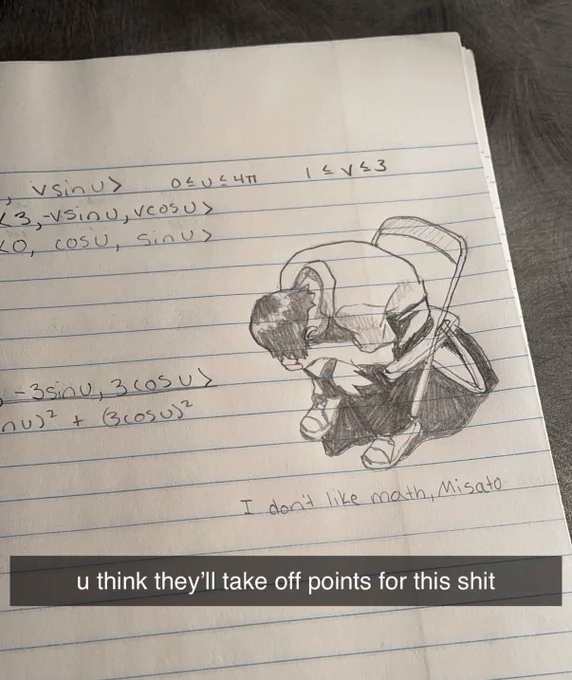this post was submitted on 12 Oct 2023
385 points (99.7% liked)
196
16905 readers
1052 users here now
Be sure to follow the rule before you head out.
Rule: You must post before you leave.
If you have any questions, feel free to contact us on our matrix channel.
founded 2 years ago
MODERATORS
you are viewing a single comment's thread
view the rest of the comments
view the rest of the comments

Tbh, yes. If I were a math teacher, I'd be so sick of everyone complaining about math all the time lmao. Hell, I'm sick of it as a non-math teacher!
Math is the literal foundation of the modern technological world. Without math, we'd have nothing. It's so much more important (and fun, but pre-uni it tends to be taught badly) than most people seem to think.
As usually I only gave points for correct results or substracted points for calculation errors, I would neither substract points for the drawing nor for the statement.
Well, yes, obviously. It was a bit hyperbole, and I should have phrased it better, but it certainly wouldn't elicit much sympathy from me.
Thats a pretty disconnected statement. The entirety of every single country's economy and a large part of your daily life runs on language, logistics and infrastructure.
Yet I bet neither high stress traffic management nor fundamentals of phonemes are things you'd consider universal knowledge.
Math leaves "basic knowledge" at the high school stage and enters "expanded logical thinking" without ever telling you while being taught pretty much everywhere in the most conservative, high impact - low retention way.
And Uni math is often just used as a sorting course to weed out people not fit for engineering jobs. Its connection to practical purposes is often faint if not noexistant.
The fact that Mathematicians use nomenclature that makes the IPA look self explainatory doesn't help.
Do you think that the economy, infrastructure, logistics, traffic management, and phones don't use math? Sure, maybe language doesn't... but we all learn language at school, though?
Especially phones and electronics. That is nearly all math. And I don't know how one could arrive at another conclusion. In addition.. you are taught the fundamentals of electronics? At least I was.
You are missing the point.
Its not about "what is in everything". If you'd go there, so is quantum physics, yet you're not taught that in high school.
The point is that the widespread passive application of concepts or certain ideas even in everyday life does not inform the usefulness of in depth understanding of the theories behind them.
Thats why I pointed out traffic engineering and linguistics, because the surface concept is extremely simple but in depth understanding is a hard field to get into.
I work in rail traffic engineering. I use the phrase (translated to english) "light blue EnKo coming, get 28504 to 503 so turn off autoswitching and dont forget short entry or use DRGT quickly" a decent amount. I would probably need a day or two to explain to you what that even meant, and a decent amount longer to have you fully grasp why everything works the way it does in that specific instance.
Yet it is a standard operation that gets used here in variations thousands of times a day.
High level mathematics are not valuable for a sizeable amount of the population. Which is why they're used as a brain tester instead.
And most people do not like getting passively tested on their learning capability with arbitrary excercises designed to weed you out instead of making the concept itself accessible to you. Hence the hatred of math as a teaching subject.
Oh and yes, I too was taught standard electronics. I bet you still can't instantly fully grasp and explain the relay plan of an industrial power plant. That's the whole problem.
It's the difference between knowing of E=mc² and understanding the proof behind it. Maths as a subject wants you to do the latter, almost every other subject is fine with the former.
Just because you like indoor plumbing, it doesn't mean you have to like wading in shit. Sure, someone's gotta do it, but thank god it isn't me.
You would be a bad teacher